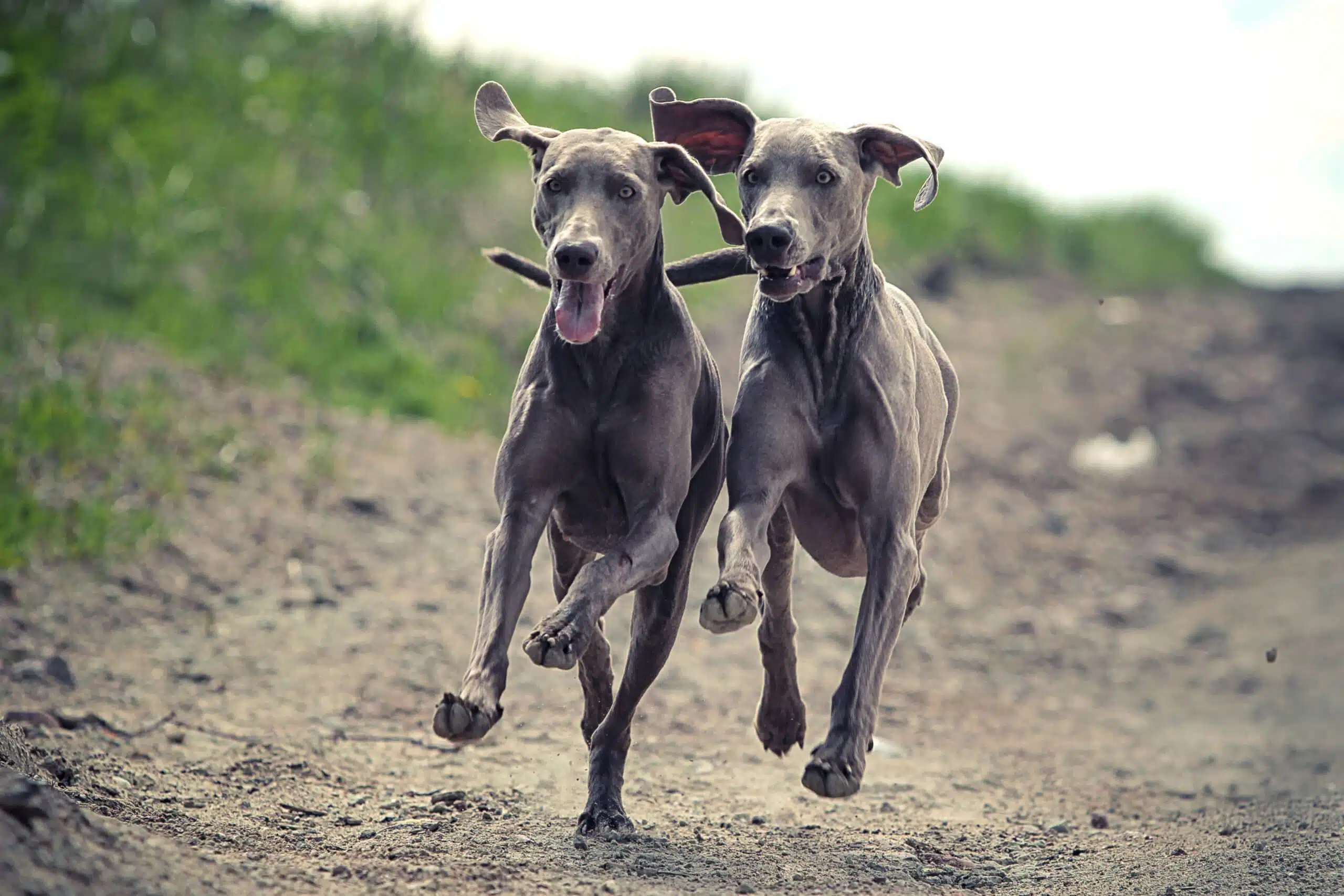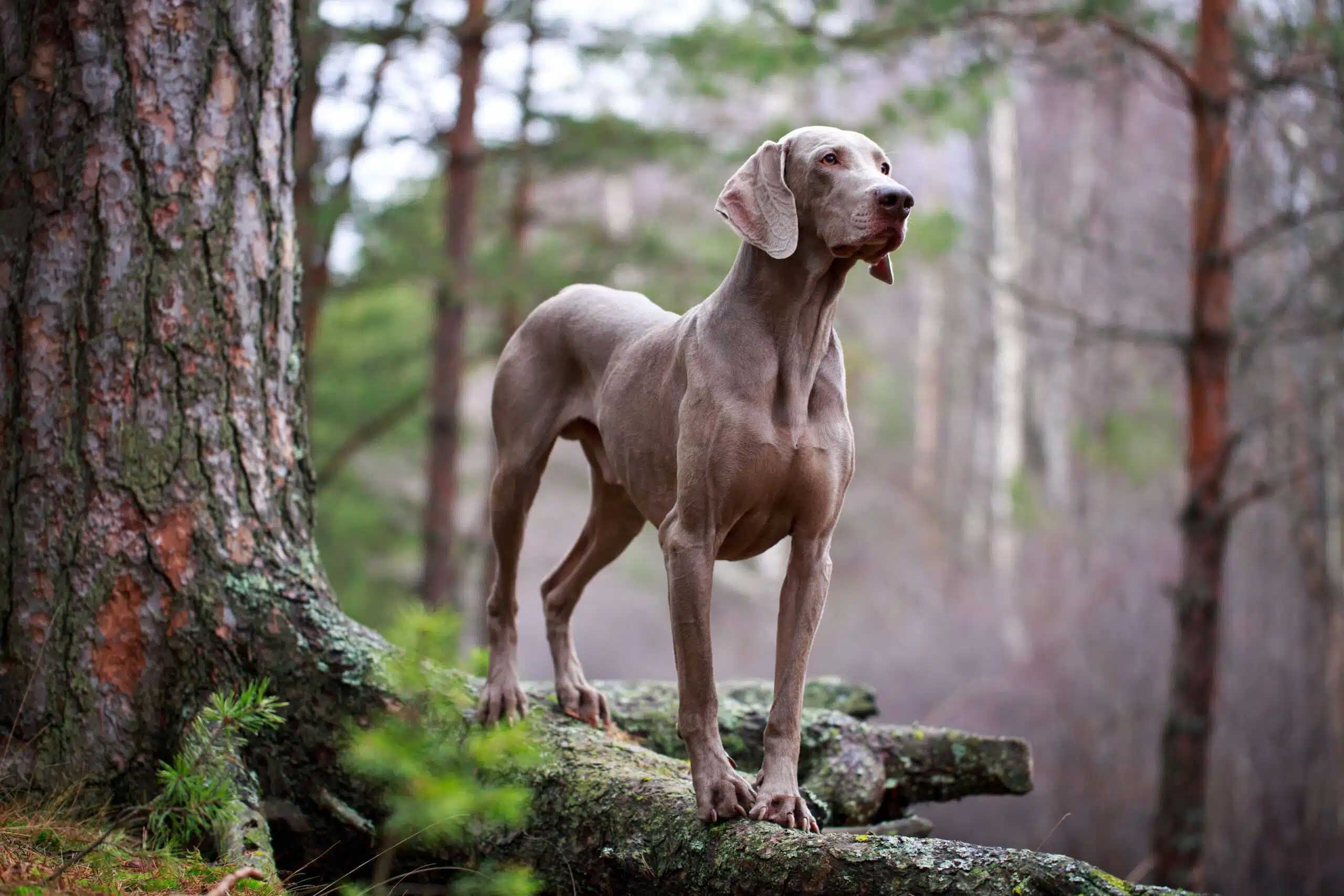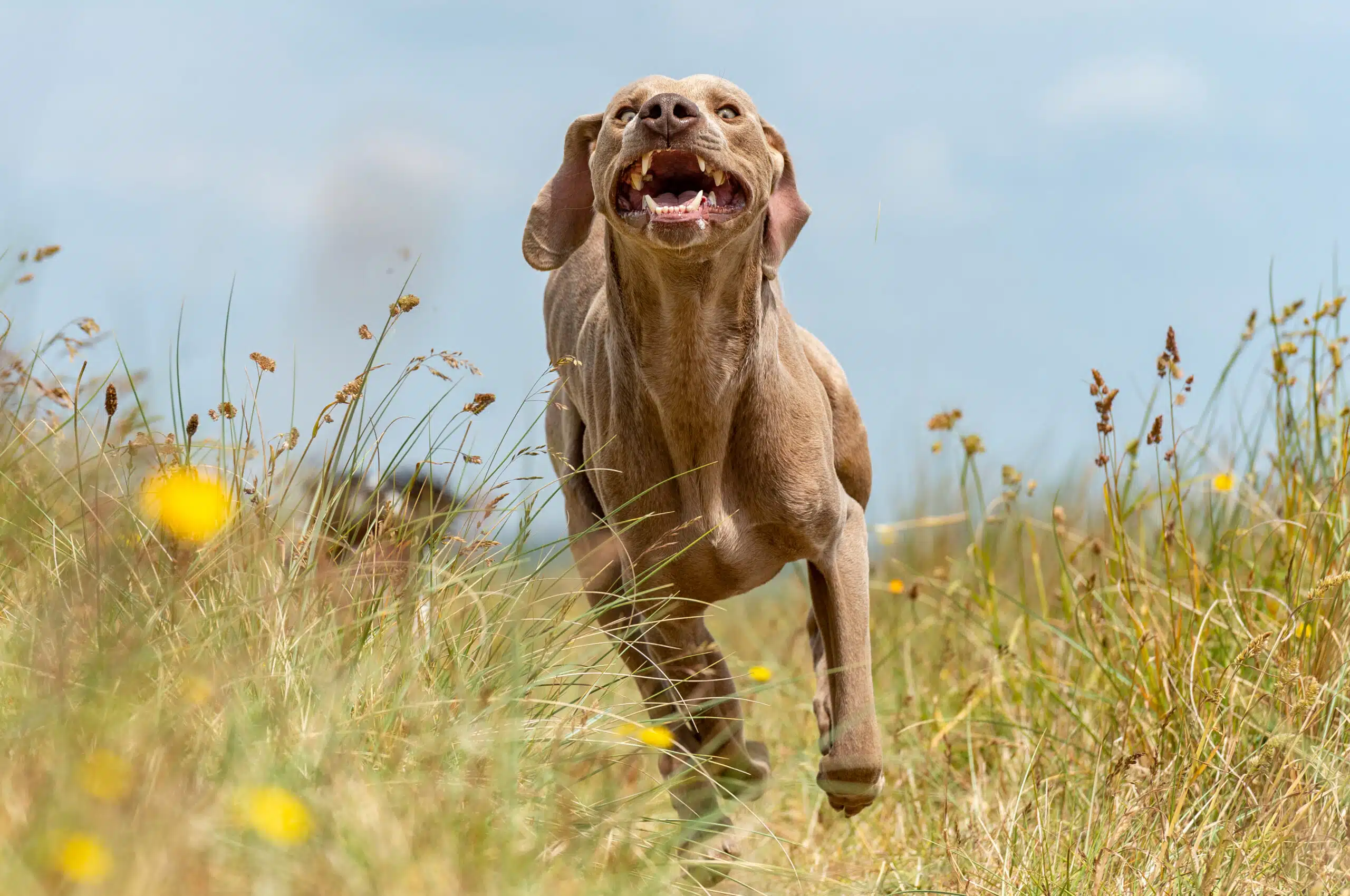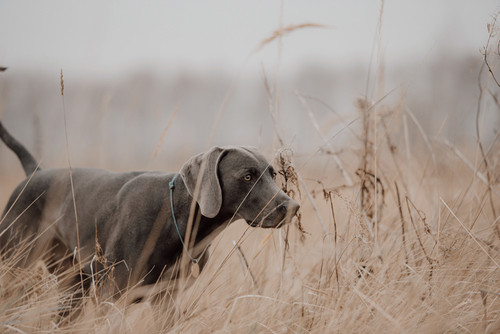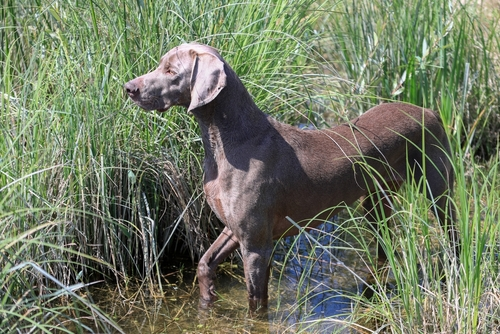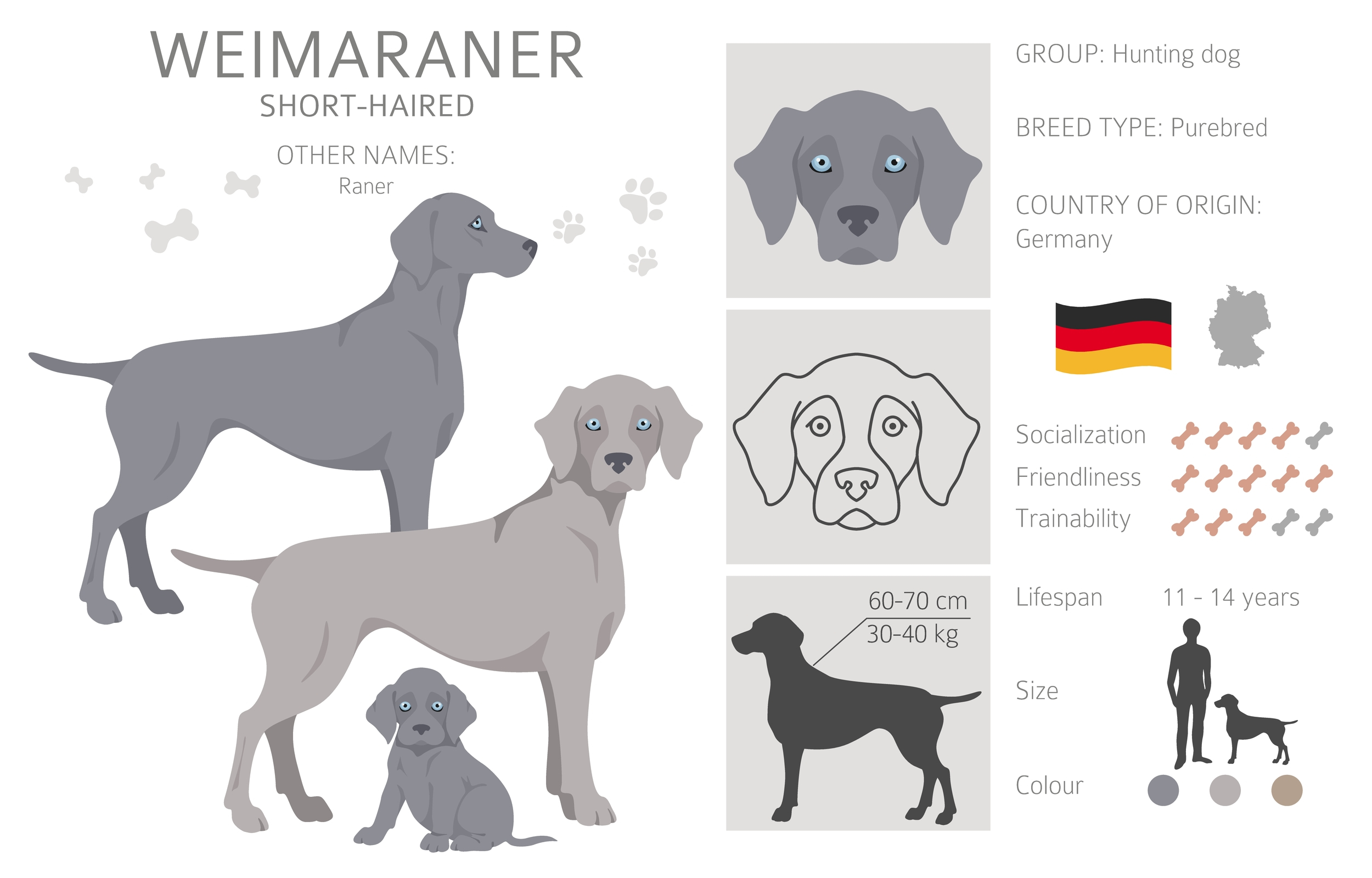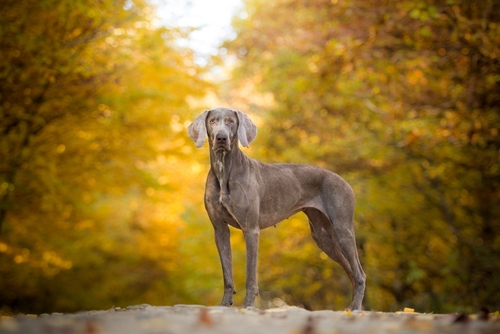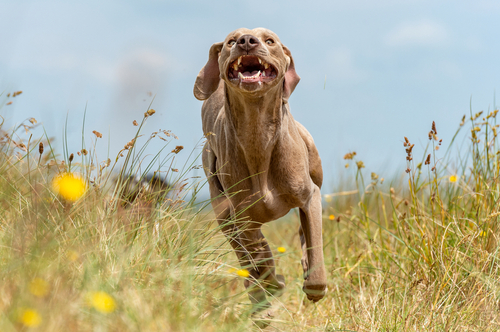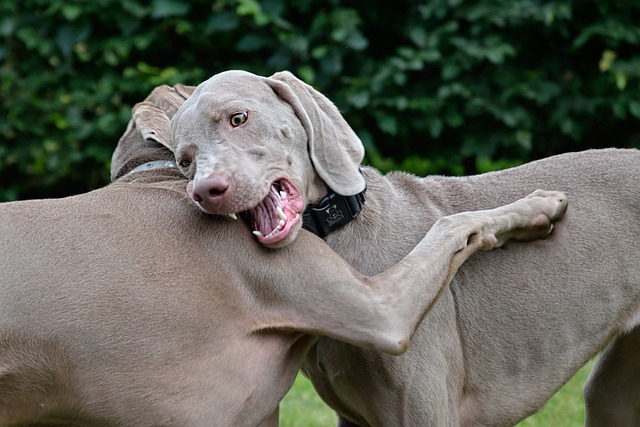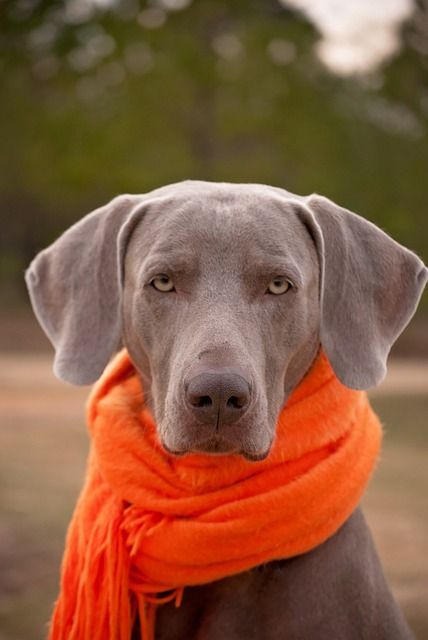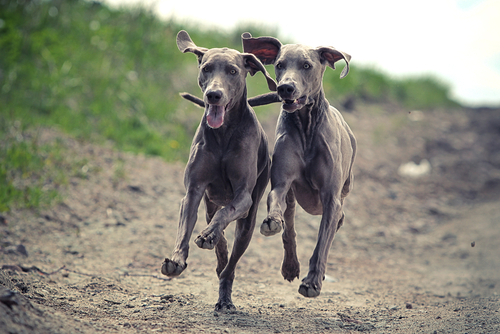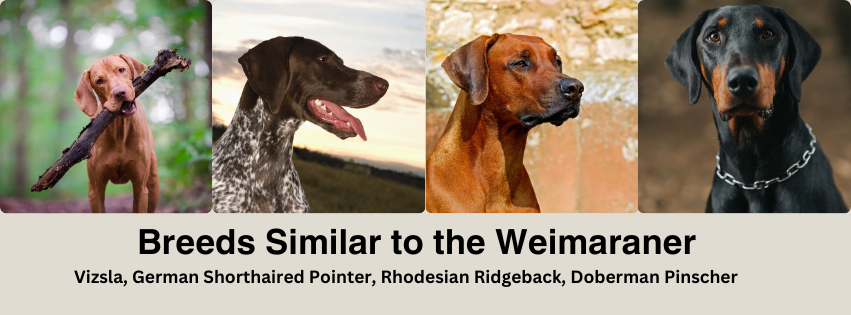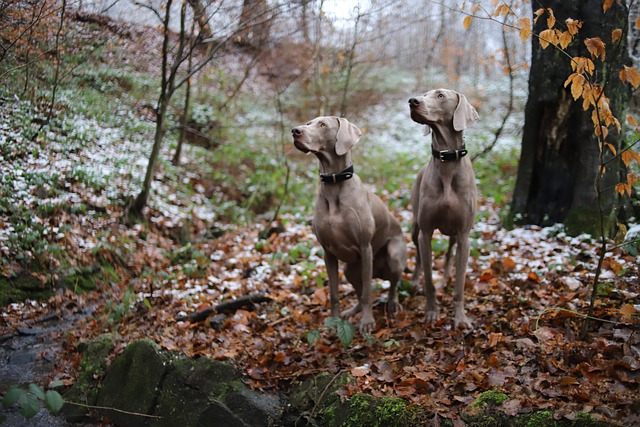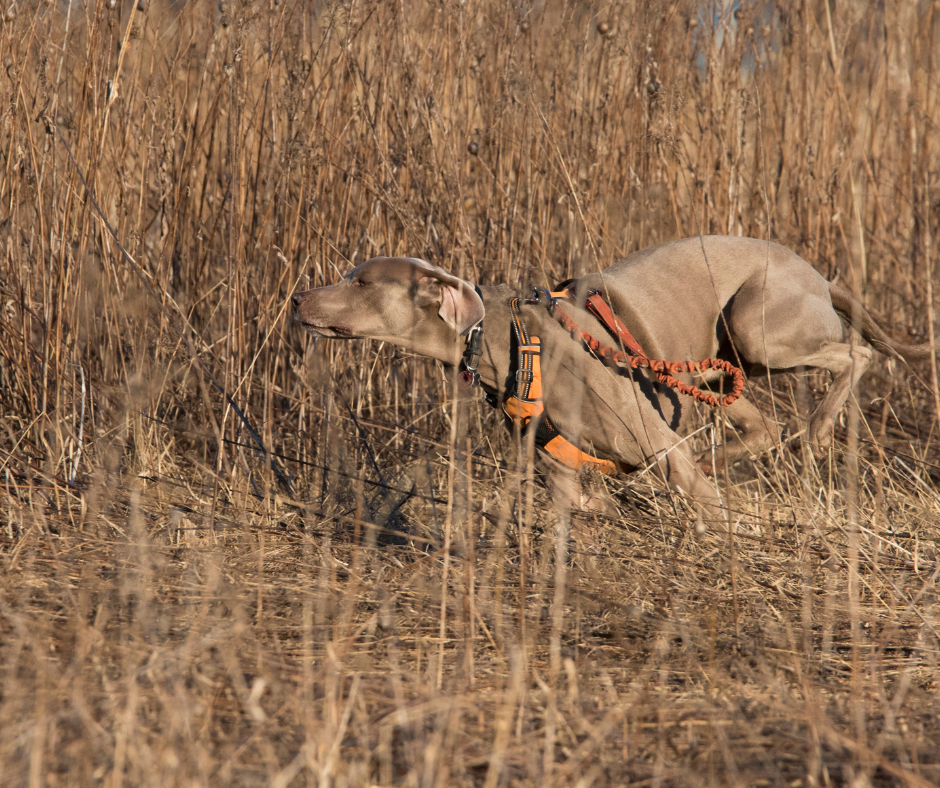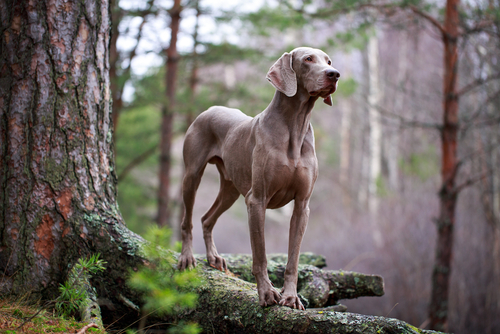Weimaraner
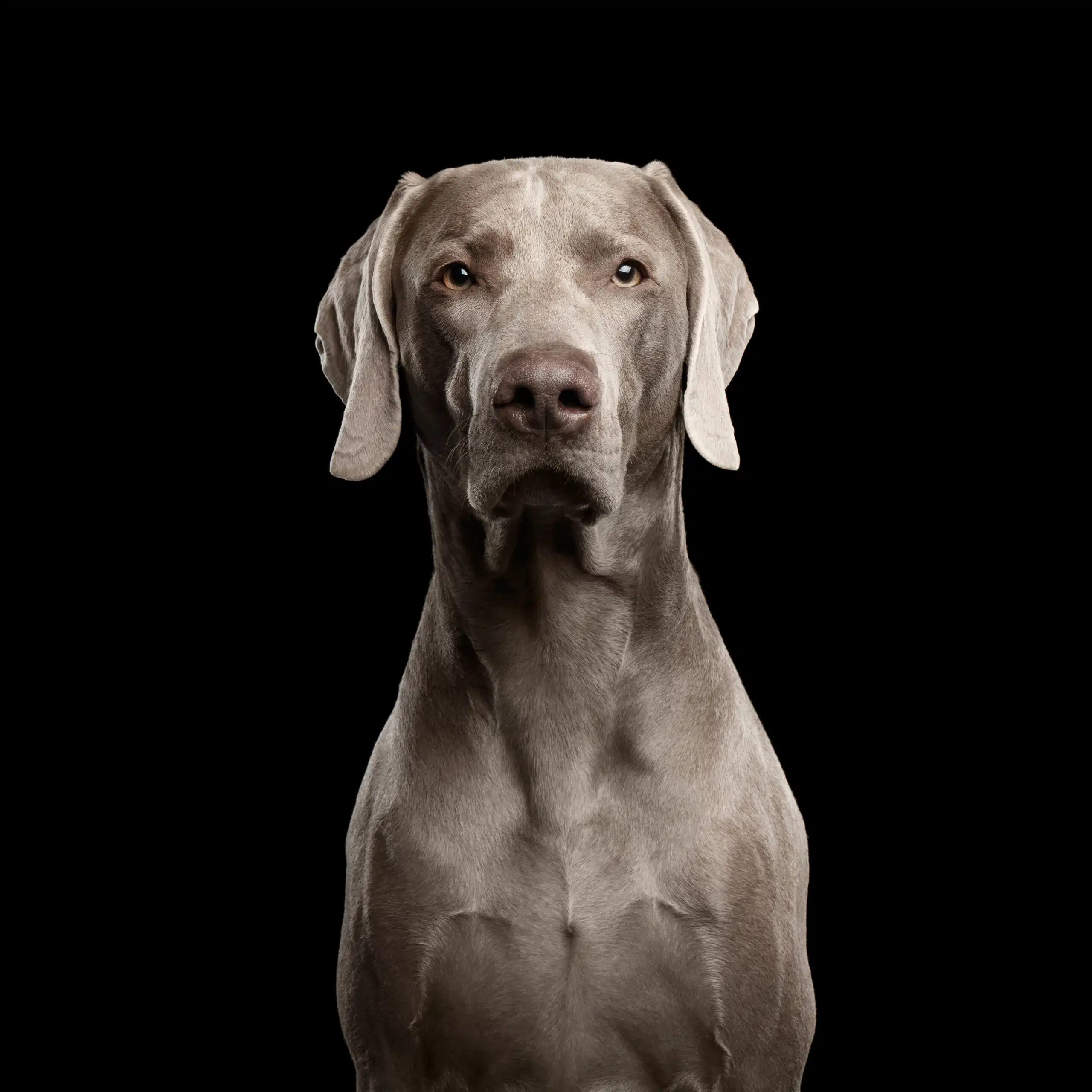
In the 1800s, Germany’s Weimar court developed the Weimaraner, a breed with remarkable courage, intelligence, and scenting abilities for hunting large game. The exact mix of breeds used is unknown, but likely included Bloodhounds, English Pointers, German Shorthaired Pointers, blue Great Danes, silver-gray dogs, and red Schweisshunde.
The result was a versatile dog capable of chasing large prey, pointing out birds, and retrieving upland game. They could hunt deer, wolves, and even bears. Known as the “Gray Ghost” for their loyalty, Weimaraners have a sleek silver coat that requires minimal grooming. They are intelligent and have a strong hunting instinct, making them great family companions.
Weimaraners require constant attention and prefer an active lifestyle. They excel in obedience training, canine sports, hiking, and agility courses. These dogs form strong bonds with their owners and can suffer from separation anxiety if left alone. They may be challenging to house-train and can be headstrong, but they adapt well to apartment living with sufficient physical activity.
Naturally wary of strangers, Weimaraners make excellent guardians but may be hostile to small animals. Early socialization and training are crucial to manage these tendencies. Crate training and gentle, firm methods are effective, as Weimaraners are sensitive and do not respond well to harsh punishment.
Weimaraners are highly intelligent and form deep bonds with their owners, making them unique and incomparable companions for those who appreciate their distinctiveness and loyalty.
The Weimaraner: A Comprehensive Guide to the “Gray Ghost”
Introduction
The Weimaraner, often called the “Gray Ghost,” is a striking and versatile dog breed known for its sleek appearance and boundless energy. Originally bred for hunting, these dogs have become popular family pets due to their affectionate and loyal nature. The Weimaraner dog is known for its active dog energetic nature, high exercise needs, and suitability for active families.
Known for being good family dogs, Weimaraners are loyal, obedient, and affectionate pets, making them ideal companions for active families most dogs who enjoy outdoor activities and travel. This article explores the Weimaraner’s history, physical characteristics, care requirements, health concerns, and temperament, offering a comprehensive understanding of this remarkable breed.
Weimaraner History and Origin
Ancient Lineage
The Weimaraner originated in the early 19th century in Germany, specifically bred by the Nobles of Weimar. They were initially used to hunt big game such as deer, boar, and bears. These hunting dogs were developed through selective breeding to enhance traits like speed, endurance, and scenting ability. The breed’s distinct dark gray under coat allowed them to blend into the forests of Germany, making them excellent hunting companions. Weimaraner history traces back to the Weimar court in Germany, where the breed was developed for hunting and companionship.
Historical Roles
Weimaraners were highly valued for their versatility in hunting. While they started as big game hunters, they eventually adapted to hunt smaller game like birds and rabbits. The breed’s keen sense of smell and remarkable agility made them exceptional hunting dogs. The Weimaraner’s loyalty and intelligence also made them excellent companions for the nobles who prized them.
Introduction to America
The Weimaraner was introduced to the United States in the early 20th century by Howard Knight, an American sportsman and breeder. Knight imported several Weimaraners to America and began breeding them. The breed quickly gained popularity due to its impressive performance in hunting and obedience trials. The American Kennel Club (AKC) recognized the Weimaraner breed in 1943, further solidifying its status in the United States.
Read More: History of Dog Breeding
Modern Recognition by the American Kennel Club
Today, the Weimaraner is recognized by major kennel clubs worldwide, including the AKC and other national breed clubs. These organizations maintain breed standards and promote responsible breeding practices. The Weimaraner Club of America (WCA), the national breed club, plays a crucial role in supporting breed enthusiasts and educating the public about this unique dog breed.
Read More: Dog Breeds Not Recognized by the AKC
Physical Characteristics
Size and Build
The Weimaraner is a medium to large breed dog, typically weighing between 55 and 90 pounds and standing 23 to 27 inches tall at the shoulder. It is important to feed Weimaraners food specifically designed for large breed dogs to ensure they receive all the necessary nutrients. These dogs are known for their athletic and muscular build, which contributes to their agility and endurance. Weimaraners have a graceful, streamlined appearance that reflects their hunting heritage.
Coat and Color
The Weimaraner’s coat is one of its most distinctive features. They have a short, sleek coat that comes in shades of mouse-gray to silver-gray. This unique coloring earned them the nickname “Gray Ghost.” The silky coat is easy to maintain but does shed, requiring regular brushing to keep it looking its best. Weimaraners also have striking blue or amber eyes, adding to their captivating appearance.
Distinct Features
Weimaraners have several distinct features that set them apart from other breeds. Their floppy ears, soulful eyes, and muscular build are immediately recognizable. The breed’s ears should be checked regularly to prevent infections, a common issue due to their floppy nature. The Weimaraner’s overall look is both elegant and powerful, making them stand out in any setting.
Grooming Needs
Despite their short coat, Weimaraners require regular grooming to keep their skin and coat healthy. Weekly brushing helps remove loose hair and distribute natural oils. Their ears need regular cleaning to prevent ear infections, and their nails should be trimmed to avoid overgrowth. Regular baths are necessary to keep their coat shiny and clean, but over-bathing can strip essential oils, so it should be done as needed.
Read More: Essential Grooming Services
Personality and Temperament
Loyalty and Affection
Weimaraners are known for their deep loyalty and affectionate nature. They form strong bonds with their family members and are often referred to as “Velcro dogs” because they love to stay close to their owners. This breed thrives on human interaction and can develop separation anxiety if left alone for long periods.
Energy Levels
Weimaraner weimaraners are high-energy dogs that require substantial daily exercise and active engagement with their human companions. They enjoy activities such as running, hiking, and playing fetch. Without enough exercise, they can become restless and exhibit destructive behavior. An active family environment is ideal for these dogs, providing both physical and mental stimulation.
Trainability
Intelligent and eagerness to please are some well known Weimaraner traits, making them relatively easy to train. They respond well to positive reinforcement techniques, such as treats and praise. Consistent training from a young age is crucial to managing their energy and curbing bad habits. Early socialization is also important to ensure they are well-behaved around other dogs and people.
Read More: Dog Training 101
Social Behavior
Weimaraners are generally good with children and can get along well with other pets if properly socialized. However, their strong hunting instincts can be problematic around small animals. They are protective of their family and can be wary of strangers, making them good watchdogs. Early socialization helps them become more confident and well-adjusted.
Care and Maintenance
Exercise Requirements
Weimaraners need at least 1.5 to 2 hours of vigorous exercise daily to stay healthy and happy. They enjoy activities that challenge them physically and mentally, such as agility training, fetch, and long walks. Regular exercise helps prevent boredom and destructive behavior. An active lifestyle is essential for this breed to thrive.
Diet and Nutrition
Weimaraner dogs require a balanced diet to maintain their health and high energy levels. High-quality large-breed dog food is recommended, with portions divided into two meals per day to prevent bloat, a life-threatening condition common in deep-chested dogs. Fresh water should always be available. It’s important to consult with a veterinarian to determine the best diet for your Weimaraner dog based on on age, weight, and activity level.
Read More: How to Pick the Best Dog Food
Health Maintenance
Routine veterinary check-ups are essential to monitor your Weimaraner’s health and catch any potential issues early. Regular dental care, including brushing and professional cleanings, helps prevent dental diseases. Keeping up with vaccinations, flea and tick prevention, and regular deworming is also important. A consistent grooming routine, including ear cleaning and nail trimming, contributes to overall health.
Health Concerns
Common Health Issues
Weimaraner health weimaraners is an important consideration, as they can be prone a few health issues due to certain genetic conditions. Common health issues include:
-
Hip Dysplasia: A genetic condition where the hip joint doesn’t fit properly, leading to arthritis and pain.
-
Bloat (Gastric Torsion): A life-threatening condition where the stomach twists, cutting off blood flow.
-
Entropion: A condition where the eyelid rolls inward, causing irritation and damage to the eye.
-
Hypothyroidism: A condition where the thyroid gland doesn’t produce enough hormones, leading to weight gain and lethargy.
-
Progressive Retinal Atrophy (PRA): A genetic disease that causes blindness over time.
Preventive Care
To minimize health issues, it’s important to get Weimaraners from a reputable breeder or breeders who perform genetic testing. Regular health screenings, a balanced diet, and proper exercise can help maintain your dog’s health. Early detection and treatment of health problems are crucial for ensuring a long and healthy life for your Weimaraner.
Lifespan
With proper care, Weimaraners typically live between 10 and 13 years. Regular veterinary care, a healthy diet, and plenty of exercise can help your dog live a long, happy life.
Living Conditions
Environment
Weimaraners need a home with ample space to accommodate their high energy levels. They thrive in homes with a fenced yard where they can run and play. Apartment living can be challenging unless the dog receives sufficient exercise. Weimaraners are not suited to being left alone for long periods and may develop separation anxiety if isolated.
Read More: Puppy Proofing Your House
Compatibility with Other Pets
Weimaraners can get along well with other pets, even large dogs, especially if raised with them. However, their strong hunting instincts can make them unsuitable for homes with small animals like rabbits or guinea pigs. Proper socialization from a young age is crucial to ensure they behave well around other dogs and pets.
Read More: Does your Dog Need a Friend?
Family Life
Weimaraners make excellent family dogs. They are loyal, protective, and affectionate with their family members. They are good with children but should be supervised around small children due to their size and energy levels. Weimaraners thrive in active families who can provide the exercise and attention they need. Early socialization is crucial for Weimaraner puppies, and adopting from reputable breeders or rescue organizations ensures they receive the best start in life.
Living Needs
Weimaraners require an environment that provides both physical and mental stimulation. They need a family that can engage them in various activities and provide consistent training and socialization. A bored or tired Weimaraner can develop destructive behaviors, so it’s important to keep them active and mentally challenged.
Training and Socialization
Training Techniques
Weimaraners respond well to positive reinforcement training methods. Using treats, praise, and play as rewards can help reinforce good behavior. Consistent training from a young age is essential to manage their high energy and strong will. Obedience classes can also be beneficial, providing structure and socialization opportunities.
Socialization Strategies
Early socialization is key to raising a well-behaved Weimaraner. Exposing them to different people, places, and animals helps them develop confidence and good manners. Puppy kindergarten classes and regular playdates can aid in socialization. It’s important to continue socializing your Weimaraner throughout their life to prevent them from becoming shy or aggressive.
Read More: How to Socialize an Adult Dog
Dog Breeds Similar to the Weimaraner
Vizsla
The Vizsla is similar to the Weimaraner in size, energy, and temperament. Both breeds are known for their high energy levels and are used extensively in hunting. Vizslas, like many Weimaraners themselves, are affectionate and loyal, making them excellent family companions. Their sleek, short coats and athletic builds make them well-suited for active families.
German Shorthaired Pointer
The German Shorthaired Pointer shares many characteristics with the Weimaraner, several breeds, including hunting abilities and energy levels. Both breeds are known for their endurance and versatility in the field. German Shorthaired Pointers are also friendly, intelligent, and require plenty of exercise and mental stimulation.
Rhodesian Ridgeback
The Rhodesian Ridgeback is larger than the Weimaraner but shares same breed and similar protective instincts and high energy. Originally bred in Africa to hunt lions, Rhodesian Ridgebacks are strong, muscular, and have a distinctive ridge of hair along their backs. They are loyal and make excellent guard dogs, but they require an experienced owner to manage their strong-willed nature.
Doberman Pinscher
The Doberman Pinscher is similar in build and energy to the Weimaraner but has a more protective nature. Dobermans are known for their loyalty, intelligence, and protective instincts. They require consistent training and socialization from an early age to ensure they are well-behaved and confident.
Popular Weimaraner Crossbreeds
Weimaraner-Labrador Retriever Mix (Labmaraner)
The Labmaraner combines the intelligence and energy of both the Weimaraner and the Labrador Retriever. This crossbreed is known for its friendly nature, making it an excellent family pet. Labmaraners are highly trainable and enjoy activities such as fetch, running, and swimming.
Weimaraner-Vizsla Mix (Vizmaraner)
This crossbreed enhances the hunting abilities and affectionate nature of both the Weimaraner and the Vizsla. Known for their high energy and strong hunting instincts, Weimaraner-Vizsla mixes are loyal and make excellent companions for both active dogs and families.
Weimaraner-German Shorthaired Pointer Mix
The Weimaraner-German Shorthaired Pointer mix blends the hunting skills and athleticism of both breeds. This crossbreed is energetic, intelligent, and requires plenty of exercise and mental stimulation. They excel in various canine sports and make excellent hunting companions.
Weimaraner-Doberman Pinscher Mix
The Weimaraner-Doberman Pinscher mix creates an ideal breed for a protective, loyal, and energetic companion. This crossbreed combines the Weimaraner’s hunting instincts with the Doberman’s guarding abilities. They require consistent training and early socialization to manage their strong-willed nature.
Activities and Sports
Canine Sports
Weimaraners excel in various canine sports, including agility, an obedience class, and dock diving. Their athleticism and intelligence make them top performers in these activities. Participating in canine sports provides physical exercise and mental stimulation, keeping them happy and healthy.
Hunting Dogs and Retrieving
Weimaraners are natural hunters and excel in fieldwork. Training them for hunting and retrieving highlights their innate abilities and provides an excellent outlet for their energy. Regular practice in hunting scenarios helps maintain their skills and keeps them engaged.
Interactive Play
Regular playtime and interactive games are essential for preventing boredom in Weimaraners. Toys that challenge their intelligence and physical abilities are particularly beneficial. Activities like fetch, tug-of-war, and puzzle toys keep them mentally and physically stimulated.
Choosing a Weimaraner
Responsible Breeders
Finding reputable breeders through breed clubs is crucial when choosing a good Weimaraner name. Responsible breeders perform health screenings and adhere to breed standards, ensuring healthy puppies. The Weimaraner Club of America is a valuable resource for finding reputable breeders and learning more about the breed.
Adoption Options
Adopting from breed-specific rescues or shelters is another option. These organizations often have Weimaraners in need of loving homes. Adoption provides a second chance for dogs and supports rescue efforts, helping to reduce the number of homeless pets.
Puppy Selection
When selecting a Weimaraner puppy, consider temperament, health, and the breeder’s reputation. Early socialization and consistent training are crucial for a weimaraner traits a well-adjusted pet. Look for puppies that are curious, friendly, and confident, indicating a good temperament.
Conclusion
Summary
The Weimaraner is a versatile and loyal breed known for its intelligence, energy, and affectionate nature. With its rich history as a hunting dog and its modern role as a family companion, the Weimaraner requires ample exercise, consistent training, and early socialization. Understanding the breed’s characteristics and needs is essential for ensuring a happy and healthy relationship.
Final Thoughts
Potential Weimaraner owners should consider the breed’s high energy levels, grooming needs, and susceptibility to certain health issues. This breed thrives in active households that can provide the physical and mental stimulation it needs. By choosing a Weimaraner, you are gaining a loyal, intelligent, and energetic companion that will bring joy and adventure to your life.
- Group AKC Sporting
- Origin Germany
- Size Large
- Weight 55 to 90 pounds
- Coat Length Short
- Coat Type Smooth
- Colors Blue, Gray, Silver Gray
- Other Names Weimaraner Vorstehhund, Weim, Grey Ghost
- Temperament Alert, Aloof, Energetic ,Fast, Intelligent, Powerful, Steady, Stubborn, Social
















